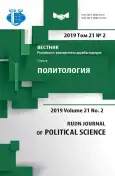RESILIENCE CONCEPT AS A METHODOLOGICAL BASIS OF A NEW APPROACH TO COUNTERING INTERNATIONAL TERRORISM
- Authors: Tulupov D.S1, Kotsur G.V1
-
Affiliations:
- Saint-Petersburg State University
- Issue: Vol 21, No 2 (2019)
- Pages: 358-372
- Section: CURRENT PROBLEMS OF POLITICAL SCIENCE
- URL: https://medbiosci.ru/2313-1438/article/view/339710
- DOI: https://doi.org/10.22363/2313-1438-2019-21-2-358-372
- ID: 339710
Cite item
Full Text
Abstract
The aim of this article is to identify actual and prospective opportunities for the use of “resilience” concept in counter-terrorism warfare. The resilience is usually defined as an ability of an individual, society or ecosystem to recover or adapt after a shock. Discourse-analysis of the local periodical press enabled authors to draw two important conclusions. Firstly, resilience as a strength feature of a (city) community is internally generated, rather than imposed from top down. Secondly, the resilience of urban population to terrorism both in Russia and in European countries has similar features, namely the high degree of low-level civil self-organization and active use of social networks potential. The relevance of resilience serves as an indicator that this concept has become a core element of a new public security paradigm in the West. At the same time, resilience is not featuring in the Russian social-political discourse at all. However, authors have identified a number of provisions in the 2009 Concept of combating against terrorism, which might be considered as feasible prerequisites for the articulation of resilience in the Russian discourse in the future. Filling this gap might be a strategically important task in context of enhancement of the Russian Federation’s strategy of counter-terrorism activity.
About the authors
Dmitriy S Tulupov
Saint-Petersburg State University
Author for correspondence.
Email: touloupovd@yandex.ru
PhD in History, Senior Lecturer of the Faculty of International Relations, Saint-Petersburg State University
Saint-Petersburg, Russian FederationGleb V Kotsur
Saint-Petersburg State University
Email: glebk17@gmail.com
Saint-Petersburg, Russian Federation
References
- Golovanova T. #home. Social Networks Humanity Worked in St. Petersburg. RIA Novosti. 04.04.2017. Available from: https://ria.ru/accents/20170404/1491463497.html. Accessed: 19.07.2017.
- Gromov V. The Explosion of the Halal Focus. Gazeta.Ru. 05.05.2010. Available from: https://www.gazeta.ru/social/2010/05/05/3363142.shtml. Accessed: 19.07.2017.
- Sidorov D. “People Have Become People”. As a Terrorist Attack in St. Petersburg Rallied the Russians. Lenta.ru. 04.04.2017. Available from: https://lenta.ru/articles/2017/04/04/ spb_humanity/. Accessed: 19.07.2017.
- Bennhold K. London’s New Normal: Resilient, Yes. But Not Entirely Intrepid. The New York Times. 06.15.2017. Available from: https://www.nytimes.com/2017/06/15/world/europe/uklondon.html. Accessed: 19.07.2017.
- Brassett J., Vaughan-Williams N. Security and the Performative Politics of Resilience: Critical Infrastructure Protection and Humanitarian Emergency Preparedness. Security Dialogue. 2015; 46 (1): 32—50.
- Chmutina K., Bosher L.S. Managing Disaster Risk and Resilience in the UK: Response vs. Prevention in Policy and Practice. The Routledge Handbook of International Resilience. Ed. by D. Chandler and J. Coaffee. London: Routledge; 2016: 267—279.
- Coaffee J., Fussey P. Constructing Resilience through Security and Surveillance: The Politics, Practices and Tensions of Security-Driven Resilience. Security Dualogue. 2015; 46 (1): 86—105.
- Cretney R., Bond S. ‘Bouncing back’ to Capitalism? Grass-Roots Autonomous Activism in Shaping Discourses of Resilience and Transformation Following Disaster. Resilience. 2014; 2 (1): 18—31.
- Dunn Cavelty M., Kaufmann M., & Søby Kristensen K. Resilience and (In)security: Practices, Subjects, Temporalities. Security Dialogue. 2015; 46 (1): 3—14.
- Evans B., Reid J. Dangerously Exposed: The Life and Death of the Resilient Subject. Resilience. 2013; 1 (2): 83—98.
- Grove K. Hidden Transcripts of Resilience in Jamaican Disaster Management. The Routledge Handbook of International Resilience. Ed. by D. Chandler and J. Coaffee. London: Routledge; 2016: 370—382.
- Hardy K. Resilience in UK Counter-terrorism. Theoretical Criminology. 2015; 19 (1): 77—94.
- Heath-Kelly C. The Disastrous Temporality of the ‘Recovery-To-Come’. The Routledge Handbook of International Resilience. Ed. by D. Chandler and J. Coaffee. London: Routledge; 2016: 307—317.
- Holling C.S. Resilience and Stability of Ecological Systems. Annual Review of Ecology and Systematics. 1973; 4 (1): 1—23.
- Holling C.S., Gunderson L.H. (Eds.). Panarchy: Understanding Transformations in Human and Natural Systems. Washington: Island Press; 2002. 536.
- Hong E. Resilience in Paris. Los Angeles Times. 13.11.2015. Available from: http://www.latimes.com/opinion/op-ed/la-oe-resilience-in-paris-20151113-story.html. Accessed: 19.07.2017.
- Joseph J. Resilience as Embedded Neoliberalism: A Governmentality Approach. Resilience. 2013; 1 (1): 38—52.
- Kaufmann M. The Digitization of Resilience. The Routledge Handbook of International Resilience. Ed. by D. Chandler and J. Coaffee. London: Routledge; 2016: 106—119.
- Kino N. The Stockholm Attack Proved the Swedish People’s Resilience. Huffington Post. 04.08.2017. Available from: http://www.huffingtonpost.com/entry/terror-attack-in-stockholmwhen-the-going-got-tough_us_58e91243e4b06f8c18beec5d. Accessed: 19.07.2017.
- Moore J. After London, Nice and Berlin Vehicle Attacks, what Can Cities Do to Prevent More? Newsweek. 23.03.2017. Available from: http://www.newsweek.com/after-london-nice-andberlin-what-can-cities-do-prevent-car-ramming-attacks-572692. Accessed: 19.07.2017.
- O'Malley P. Resilient subjects: Uncertainty, Warfare and Liberalism. Economy and Society. 2010; 39 (4): 488—509.
- Rodin J. The Boston Marathon Bombing: How the City Coped with its Deadly Terror Attack. The Guardian. 12.02.2015. Available from: https://www.theguardian.com/cities/2015/jan/12/ boston-marathon-bombing-how-city-coped-deadly-terror-attack. Accessed: 19.07.2017.
- Thiede B. Resilience and Development among Ultra-Poor Households in Rural Ethiopia. Resilience. 2016; 4 (1): 1—13.
- West J. Securing ‘‘Resilient Communities’’ to Prevent Terrorism. The Routledge Handbook of International Resilience. Ed. by D. Chandler and J. Coaffee. London: Routledge; 2016: 318—330.
- Wretborn S. Stockholm — A city of Diversity and Resilience. Stockholm Data Parks. 10.04.2017. Available from: https://stockholmdataparks.com/2017/04/10/stockholm-citydiversity-resilience/. Accessed: 19.07.2017.
- Yusuf H. Truck Drives into Crowd in Stockholm, Killing Four People. The Guardian. 07.04.2017. Available from: https://www.theguardian.com/world/2017/apr/07/truck-crashesin-central-stockholm-sweden. Accessed: 19.07.2017.
Supplementary files









